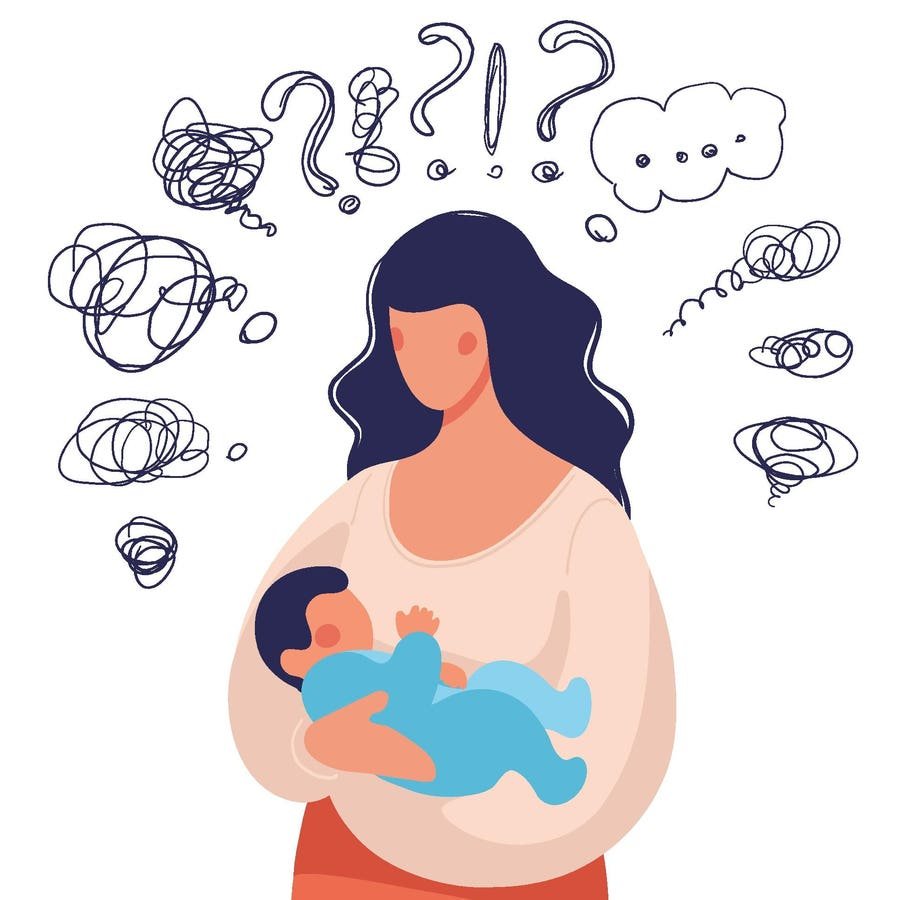For some women, motherhood is a dream-like experience. For others, however, it can lead them to … [+]
Pregnancy is a life-changing experience for most women, radically affecting both their body and mind. During this time, mothers face a bombardment of rapid and extreme physical changes, coupled with massive hormonal transformations. While some women breeze through the process – glowing and basking in the glory of impending motherhood – for others, pregnancy can be an exhausting ordeal.
Very unfortunately, for some mothers, the horrors of pregnancy do not end after 40 weeks of pregnancy. The postpartum period is a precarious time for women, characterized by a significant risk of decreased mental well-being. While many people are familiar with postpartum mental complications—such as postpartum depression, anxiety, or even rage—there is a small percentage of mothers who experience something far worse: postpartum psychosis.
What is “postpartum psychosis”?
According to a 2018 study from Eastern Journal of Medicine, the postpartum period is an incredibly dangerous time for mothers, during which they are 22 times more likely to experience psychotic or manic meltdowns. The authors define postpartum psychosis as an extremely rare and severe postpartum psychiatric disorder, affecting between 0.1-0.2% of new mothers.
Many aspects of pregnancy and the postpartum period are thought to contribute to the onset of postpartum psychosis. These risk factors include:
- Primordiality. Being a first time mother.
- Changes in ovulation hormones. Significant hormonal fluctuations after childbirth.
- Sleep deprivation. Severe lack of sleep, which can worsen mental health problems.
- Pregnancy/postpartum complications. These include factors such as environmental stress, complications during childbirth (eg traumatic birth, miscarriage, stillbirth, etc.) or congenital malformations of the baby.
- Comorbidities with other psychiatric disorders. For example, the presence of bipolar disorder increases the likelihood of postpartum psychosis by 25–50%. Similarly, the onset of postpartum psychosis has been linked to 40-80% of mothers subsequently developing bipolar disorder.
The experience of postpartum psychosis can vary greatly from one mother to another, but there are several common symptoms that have been identified. These include insomnia, mood swings, as well as obsessive, uncontrollable and often irrational thoughts centered around their baby’s well-being. However, after these symptoms appear, more serious symptoms may appear:
- Hallucinations. Strongly mistaken beliefs, often paranoid in nature.
- Hallucinations. Seeing, hearing or feeling things that aren’t there.
- Disorganized behavior. Inability to organize thoughts or actions consistently.
- Psychomotor stimulation. Increased physical movement and activity driven by mental tension.
- Food rejection. Refusal to eat, often due to hallucinations or severe anxiety.
- Delirium. Acute confusion and impaired awareness.
- Severe mood swings. Extreme mood swings, ranging from euphoria or mania to severe depression — or mixed episodes.
- Catatonia. Unresponsive state or unusual physical stiffness.
By ignoring, downplaying, or failing to recognize any combination of these symptoms, mothers can quickly become a great danger to both their babies and themselves.
What does “Postpartum Psychosis” look like?
To illustrate the extreme and dangers of rampant postpartum psychosis, consider a case study posing in his magazine Treatment in Psychiatry. It depicts Mrs. A, a 34-year-old mother, three weeks after the birth of her son, B. Living with her husband and their 5-year-old daughter, Mrs. A had a planned and healthy pregnancy, although she experienced some depression at 28 weeks’ gestation. . Her delivery was normal and she began breastfeeding immediately.
From postpartum days 2 to 11, Mrs. A’s depression worsened. She struggled with severe insomnia, had difficulty getting out of bed, and was unable to take care of her hygiene. She became increasingly suspicious and feared that her husband might harm their baby. On day 2, she started having painful and disturbing thoughts of throwing her baby out the window and that her breast milk was also harming him. She was treated with reassurance by her pediatrician.
By day 12, her mental condition had further deteriorated. She thought about harming herself and her baby and eventually attempted suicide by overdosing. Although she survived, she did not inform anyone of her attempt. As her condition worsened, she became disorganized and confused, particularly about feeding B. She was very agitated and sought constant reassurance from friends about formula, bottles, and diapers.
On day 15, Mrs. A tried to strangle B, but stopped when she heard her husband arrive home. She claimed that she did not feel compelled to harm B after that night, but her mental state remained fragile. Although her husband noticed that she was not herself, he did not realize the seriousness of her condition. He did not seek or receive treatment after this incident.
Tragically, on day 20, Mrs A experienced a major psychotic episode. She felt as if she was in a daze, describing being “possessed” by an uncontrollable force. In this state, he choked B, eventually killing him. She then tried to end her life, but her attempt was unsuccessful. After her episode and the death of her baby, Mrs A was later charged with manslaughter and imprisoned.
The bottom line
The postpartum period is a critical time for mothers, who are both at enormous risk and often overlooked. Despite the enormous challenges they face, women are often told from a young age that difficulties—whether they suffer from caregiving, menstruation, pregnancy, or postpartum difficulties—are just part of “what it means to be a woman.” This outrageous myth leads many women to internalize their complications and concerns, however serious they may be.
This dangerous mentality, coupled with recent foundings The emergence of women’s significant dissatisfaction with the professional services available after childbirth can have dire consequences for both mothers and their families. Without a support system, early intervention or health professionals who take women’s experiences seriously, helpless mothers can tragically become criminals in the blink of an eye – when in reality they are simply victims of circumstances beyond their control.
Are the burdens of parenthood weighing you down? take it Assessment of parental burnout to find out if you need professional support.
